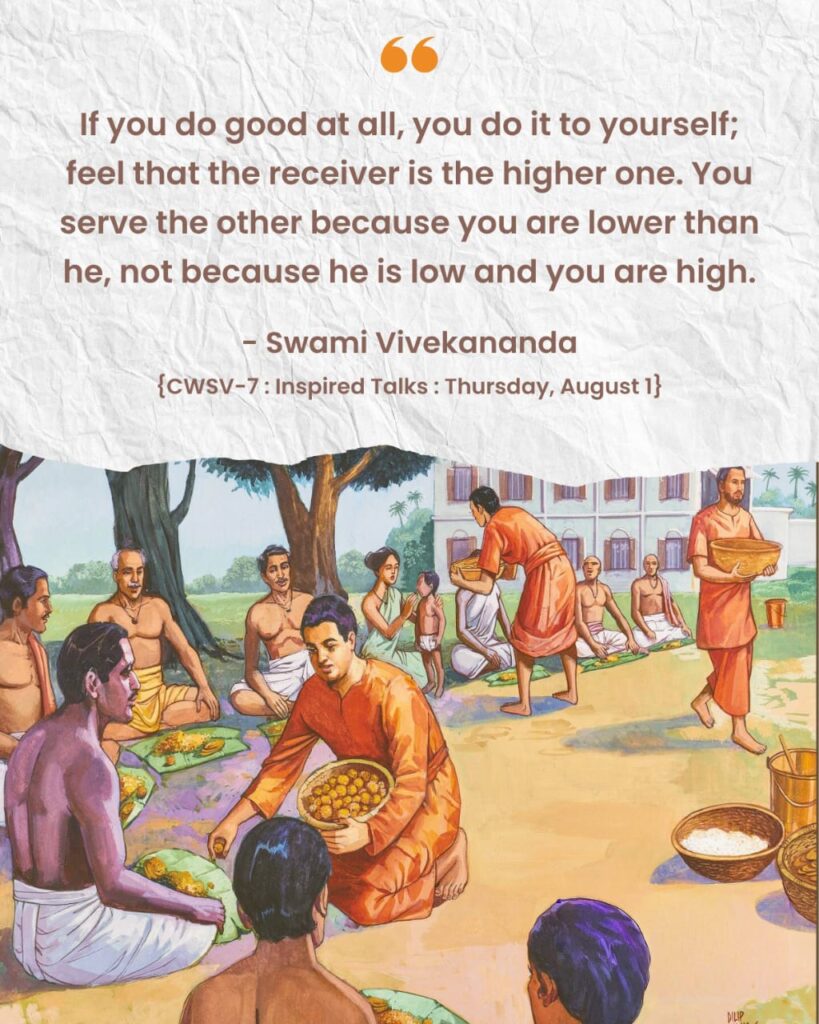दातव्यमिति यद्दानं दीयतेऽनुपकारिणे |
देशे काले च पात्रे च तद्दानं सात्त्विकं स्मृतम् || 20||
dātavyam iti yad dānaṁ dīyate ‘nupakāriṇe
deśhe kāle cha pātre cha tad dānaṁ sāttvikaṁ smṛitam
dātavyam—worthy of charity; iti—thus; yat—which; dānam—charity; dīyate—is given; anupakāriṇe—to one who cannot give in return; deśhe—in the proper place; kāle—at the proper time; cha—and; pātre—to a worthy person; cha—and; tat—that; dānam—charity; sāttvikam—in the mode of goodness; smṛitam—is stated to be
Translation:
That gift which is made to one who can make no return, and with the feeling that it is one’s duty to give, and which is given at the right place and time and to a worthy person— such a gift is held to be of the nature of sattva.
Commentary:
Datavyam iti – Every man should offer charity as a sacred duty, and not for gaining honour and fame in the world. “It is my duty to offer this gift to this man, and therefore I am giving it” – such should be the spirit behind all acts of a beneficent nature. In truth, whatever good we do to others, whatever sacrifice we make for the sake of others, is a good done unto one’s own self. So, when we help poor and needy people, let us remember that we are not supporting them, for, the Lord is the support to all, but adding to the pile of our to own righteousness which will greatly advance our own spiritual aim.
Anupakarine: Charity offered to persons from whom no return benefit is expected, is the highest. The utterly poor, the blind, the lame, the disease, the neglected are fit subjects of charity. It is done out of sheer compassion, and such feelings soften the heart and enable men to understand the secret of oneness of all beings. Gifts offered to the rich and powerful are vitiated by the secret motive of receiving some benefit from them in due time. Hence it is not an act of spiritual merit.
Dese: Gifts offered in holy places, temples and hermitages are the best. ‘Kale’ -charity given on auspicious and sacred occasions like the eclipse (grahanam) Sankranti, or one’s own birthday, or anniversary of elders, is the best.
Patre: The recipient of charity should be fit and worthy to receive it. The hungry man at the door is the fittest person for ‘annadana’. So the giver should consider the time, place, and the person when he offers charity, and he should give it without expecting anything in return.


Sri Ramakrishna Says —
The Master was conversing with Mahimacharan. He asked him: “Isn’t feeding people a kind of service to God? God exists in all beings as fire. To feed people is to offer oblations to that Indwelling Spirit. But then one shouldn’t feed the wicked, I mean people who are entangled in gross worldliness or who have committed heinous crimes like adultery. Even the ground where such people sit becomes impure to a depth of seven cubits. Once Hriday fed a number of people at his native place. A good many of them were wicked. I said to Hriday: ‘Look here. If you feed such people I shall leave your house at once.’ (To Mahima) I hear that you used to feed people; but now you don’t give any such feasts. Is it because your expenses have gone up?” (Laughter.) (Source: Gospel of Sri Ramakrishna)
—–
M. saluted the Master and they conversed on the south verandah.
MASTER: “I want to know how you meditate. When I meditated under the bel-tree I used to see various visions clearly. One day I saw in front of me money, a shawl, a tray of sandesh, and two women. I asked my mind, ‘Mind, do you want any of these?’ I saw the sandesh to be mere filth. One of the women had a big ring in her nose. I could see both their inside and outside — entrails, filth, bone, flesh, and bloods The mind did not want any of these — money, shawl, sweets, or women. It remained fixed at the Lotus Feet of God.
“A small balance has two needles, the upper and the lower. The mind is the lower needle. I was always afraid lest the mind should move away from the upper needle — God. Further, I would see a man always sitting by me with a trident in his hand. He threatened to strike me with it if the lower needle, moved away from the upper one.
“But no spiritual progress is possible without the renunciation of ‘woman and gold’. I renounced these three: land, wife, and wealth. Once I went to the Registry Office to register some land, the title of which was in the name of Raghuvir. The officer asked me to sign my name; but I didn’t do it, because I couldn’t feel that it was ‘my’ land. I was shown much respect as the guru of Keshab Sen. They presented me with mangoes, but I couldn’t carry them home. A sannyasi cannot lay things up.
“How can one expect to attain God without renunciation? Suppose one thing is placed upon another; how can you get the second without removing the first?
“One must pray to God without any selfish desire. But selfish worship, if practised with perseverance, is gradually turned into selfless worship. Dhruva practised tapasya to obtain his kingdom, but at last he realised God. He said, ‘Why should a man give up gold if he gets it while searching for glass beads?’
“God can be realised when a man acquires sattva. Householders engage in philanthropic work, such as charity, mostly with a motive. That is not good. But actions without motives are good. Yet it is very difficult to leave motives out of one’s actions.
“When you realise God, will you pray to Him, ‘O God, please grant that I may dig reservoirs, build roads, and found hospitals and dispensaries’? After the realisation of God all such desires are left behind.
“Then mustn’t one perform acts of compassion, such as charity to the poor? I do not forbid it. If a man has money, he should give it to remove the sorrows and sufferings that come to his notice. In such an event the wise man says, ‘Give the poor something.’ But inwardly he feels: ‘What can I do? God alone is the Doer. I am nothing.’
“The great souls, deeply affected by the sufferings of men, show them the way to God. Sankaracharya kept the ‘ego of Knowledge’ in order to teach mankind. The gift of knowledge and devotion is far superior to the gift of food. Therefore Chaitanyadeva distributed bhakti to all, including the out-caste. Happiness and suffering are the inevitable characteristics of the body. You have come to eat mangoes. Fulfil that desire. The one thing needful is jnana and bhakti. God alone is Substance; all else is illusory. (Source: Gospel of Sri Ramakrishna)
—-
“The youngsters are yet untouched by ‘woman and gold’. That is why I love them so dearly. Hazra says to me, ‘You love a boy if he comes from a wealthy family or if he is handsome.’ If that is so, then why do I love Harish, Latu, and Narendra? Narendra hasn’t a penny to buy salt to season his rice. (Source: Gospel of Sri Ramakrishna)
Although Shambhu was generous, he was also careful about his charity. The Master’s nephew Hriday one day asked Shambhu for some money. Shambhu told him: “Why should I give you money? You can earn your livelihood by working. Even now you are earning something. The case of a very poor person is different. The purpose of charity is fulfilled if one gives money to the blind or the lame.” Hriday then said: “Sir, please don’t say that. I don’t need your money. May God help me not to become blind or deaf or extremely poor! I don’t want you to give, and I don’t want to receive.” (Source: They Lived with God)
Question: What is Sattvic Charity?
Answer: 1. It should be decided upon after due consideration 2. It should be offered to persons from whom no return is expected. 3. It should be in conformity with time, place and the fitness of the recipient.
Bhagavad Gita: Chapter 17 🔻 (28 Verses)
